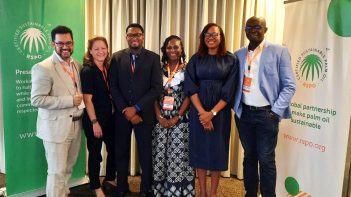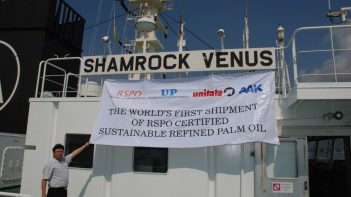In Sierra Leone, farmers have been traditionally growing oil palm as a subsistence crop intermingled with other crops in small-scale farming systems for decades. Nedoil, an RSPO member, operates a small palm oil mill in Yele town and sources fresh fruit from a network of smallholder farmers, whose plantations have been certified in accordance with the European Union’s organic standard. In 2016, Nedoil received a grant from the RSPO Smallholder Support Fund (RSSF) to help these smallholders achieve RSPO certification.
The RSPO Standard pays special attention to land tenure issues and requires growers to demonstrate proof of land ownership for oil palm cultivation. Many industrial oil palm plantations are large-sale monocrops. Some governments of palm oil producing countries lease the land to the companies, often disregarding the rights of the indigenous people who live on that land. This has led to human rights violations and dispossession of communities from their lands and natural resources. Hence, the RSPO Standard addresses issues related to the land rights diligently. In Sierra Leone, this particular criterion is difficult to fulfil due to the weak national legislation that does not provide security to the land users. At present, there is no proper cadastral mapping and land information in place, and forms of tenure under customary law are unclear and diverging. This can spark conflict both within and amongst local communities, increasing the vulnerability of their source of livelihood and economic opportunities.
Fortunately, the Sierra Leonean government recognises the existing issues and the importance of a secure land tenure system for the country’s continuous development. On 1 August 2015, the Ministry of Lands, Country Planning and the Environment issued a National Land Policy of Sierra Leone to move towards a clearer, more effective, and just land tenure system. In 2016, Nedoil joined forces with the civil society organisation and fellow RSPO member Solidaridad West Africa (SWA). The collaboration included facilitation of stakeholder consultations, training on land governance and land rights in the local dialect, and developing land rights documentation recognised by the local authorities. The initiation of this land tenure documentation process was made possible with the additional support from RSSF.
In 2017, Nedoil and SWA began the initial consultations with chiefdom local stakeholders and traditional leaders on tenure security and governance of land. The consultations were conducted in collaboration with Women’s Forum for Human Rights and Democracy Sierra Leone (WOFHRAD-SL). Special attention was paid to the issues related to the marginalisation of the vulnerable groups in regard to land rights. A majority of women in Sierra Leone are engaged in agriculture, however they are generally discriminated against under customary law, and their access to land is indirect and insecure. For instance, women are given access to land but only through their husbands, while girls do not have equal rights as their brothers’ to inherit and control land, and in some communities, once a woman is married, she has no right to inherit property including land from her parents. The new policy ensures that all citizens can exercise their tenure rights without discrimination.
In the course of the consultations, many issues emerged relating to how the different chiefdoms view the cross-cutting issue of gender in land governance system within the given domains. Women highly appreciated the awareness raising activity, for informing them about their rights to land. However, regardless of what the respective traditions say concerning women land ownership and tenure security, all traditional leaders perceived the innovation brought about with the new policy as good and progressive.
After the consultations on the land tenure issues with the chiefdom stakeholders, Nedoil and SWA started a process of obtaining the land rights documentation for the smallholders. Since there is no proper cadastral mapping in place, the company assisted farmers in mapping their plantations. The maps were used to prepare official documents that are signed by the families who own the plantations, the land users, and customary and legal chiefdom authorities, especially the Paramount Chief (PC). The land rights template was developed using SWA expertise from smallholder focused project in Ghana, further refined to represent Sierra Leonean situation by Namati.
Abdulai Gbla, a smallholder beneficiary of this project, said he feels more secure now after having understood the importance of land documentation, something he knew nothing of before the project started. He highlighted that one of the key learning outcomes during the mobilisation and community sensitisation part of the project was the fact that he can now distinguish the differences between landowners and land users, which is now made clear through the land rights document.
Article written by Larysa Zaneuskaya, Sustainability Coordinator at Natural Habitats
Keep reading

RSPO hosts first Africa downstream sustainable palm oil supply chain forum in Cape Town

Nearly two decades on, Europe continues to drive global demand for RSPO Certified Palm Oil

Communicating Sustainable Palm Oil - examples of success across Europe
[EOT] Terms of Reference: Independent Smallholders Outreach Programme in Indonesia

RT2023 Delegates Propose Solutions to Reinforce RSPO’s Assurance System – End-Year Highlights of Assurance Standing Committee
RSPO UK Members' Day Examines Shifting Dynamics of Doing Business within Europe

Celebrating 20 Years of RSPO’s Sustainability Journey




